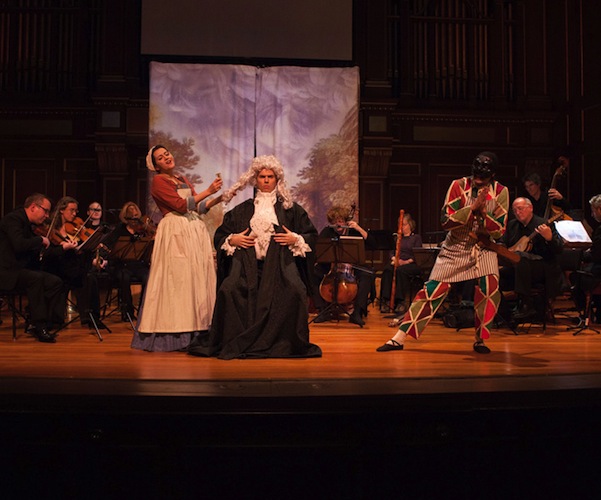Fuse Opera Review: BEMF Stages Two Delightful Neapolitan Comic Operas
BEMF’s double bill of two short and comic Pergolesi operas made for an unusual and totally delightful presentation.

Douglas Williams (Umberto), Amanda Forsythe (Amanda), and Carlos Fittante (Vespone) in BEMF’s double bill of two short Pergolesi operas. Photo: Kathy Wittman.
By Susan Miron
For the seventh consecutive year, the Boston Early Music Festival has graced Thanksgiving weekend with performances of highly enjoyable operas. This year’s double bill of two short Pergolesi operas made for an unusual and totally delightful presentation.
Known primarily for his most famous work, the Neapolitan comic opera La Serva Padrona (Maid as Master), the short-lived Giovanni Battista Pergolesi (1710-1736) composed two short (less than an hour each) comic operas, La serva padrona (1733) and Livietta e Tracollo (1734) as interludes meant to be performed during the intermissions – as intermezzi – of his longer, fully-staged opera seria. (La Serva Padrona served as the entr’actes for his very serious Il Prigionier Superbo). These pieces soon because untethered from the more serious operas, pleasing audiences as autonomous satires that deployed a variety of masquerades to safely mock social conventions.
Stage Director Gilbert Blin decided to “interweave” scenes of the two separate comedies, without pause, and with each other’s casts still on stage. Thus, the scenes of each opera acted as each other’s intermezzo. Rather than set each opera before and after intermission, the first scene of La serva padrona segued into the first scene of Livietta e Tracollo, and then back and forth again, continuing this pattern until the intermission and the very end, when the two casts appeared on stage together, “merging,” in the words of Blin, one cast singing, both dancing. The action of the plays ricocheted back and forth because the performance took place in front of the stage with only a painted backdrop, and only two characters in each opera sang. It was a clever conception, but next time I wouldn’t mind seeing one charmer of an opera at a time.
A veteran attender of most of BEMF’s opera productions, I was, as always thrilled by the quality of the singing and of the rock-solid, conductorless thirteen-piece instrumental ensemble led by the charismatic violinist Robert Meely. Bravo to the continuo players, Music Directors Steven Stubbs (theorbo and Baroque guitar) and Paul O’Dette (archlute and mandolin), Avi Stein (harpsichord), who were superb. Dance and movement, integral parts of BEMF’s operas, were handled with their customary charm and style, (Melinda Sullivan is their “movement coordinator”) and Anna Watkins’ costumes were, as usual, a pleasure to behold.
La Serva Padrona came first, starring Boston’s beloved soprano Amanda Forsythe in the role of the wily and capricious servant Serpina, who manages to get her wealthy but not terribly bright boss Uberto – after some fancy machinations – to finally marry her. Douglas Williams was a charming Uberto (in La Serva Padrona) who, like Jesse Blumberg, the hero of Livietta, sang beautifully but, alas!, was the victim of the deceit and trickery of a woman who loved him. Both men found themselves maneuvered into marriage before they knew what had hit them. The country girl Livietta was played by the lovely, funny, and beautiful-voiced Erica Schuller who, like her counterpart in La Serva Padrona, knew exactly how to get “her” man, who (interestingly) had tried to rob and then almost kill (!) her brother. Livietta and the opera’s villain make use of several disguises, but no one is fooled, on- or off-stage. The comic acting of all the singers (and silent characters) was terrific. It would be hard to come up with a less stressful, more enjoyable way to spend the end of a Thanksgiving weekend in Boston.
BEMF will be presenting a trilogy of operas (Ulisse, Poppea, and Orfeo) by Claudio Monteverdi during its upcoming weeklong festival (June 7-14, 2015). Monteverdi’s extremely popular Vespers of 1610 will be performed as well.
Susan Miron, a harpist, has been a book reviewer for over 20 years for a large variety of literary publications and newspapers. Her fields of expertise were East and Central European, Irish, and Israeli literature. Susan covers classical music for The Arts Fuse and The Boston Musical Intelligencer. She is part of the Celtic harp and storytelling duo A Bard’s Feast with renowned storyteller Norah Dooley and, until recently, played the Celtic harp at the Cancer Center at Newton Wellesley Hospital.
Tagged: Amanda Forsythe, Boston Early Music Festival, Gilbert Blin, Giovanni Battista Pergolesi
